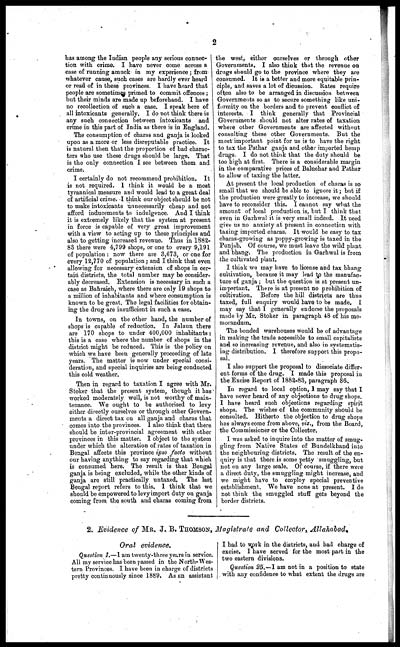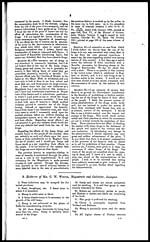Download files
Individual page:
Thumbnail gallery: Grid view | List view

2
has among the Indian people any serious connec-
tion with crime. I have never come across a
case of running amuck in my experience; from
whatever cause, such cases are hardly ever heard
or read of in these provinces. I have heard that
people are sometimes primed to commit offences;
but their minds are made up beforehand. I have
no recollection of such a case. I speak here of
all intoxicants generally. I do not think there is
any such connection between intoxicants and
crime in this part of India as there is in England.
The consumption of charas and ganja is looked
upon as a more or less disreputable practice. It
is natural then that the proportion of bad charac-
ters who use these drugs should be large. That
is the only connection I see between them and
crime.
I certainly do not recommend prohibition. It
is not required. I think it would be a moat
tyrannical measure and would lead to a great deal
of artificial crime. I think our object should be not
to make intoxicants unnecessarily cheap and not
afford inducements to indulgence. And I think
it is extremely likely that the system at present
in force is capable of very great improvement
with a view to acting up to these principles and
also to getting increased revenue. Thus in 1882-
83 there were 4,799 shops, or one to every 9,191
of population: now there are 3,673, or one for
every 12,770 of population; and I think that even
allowing for necessary extension of shops in cer-
tain districts, the total number may be consider-
ably decreased. Extension is necessary in such a
case as Bahraich, where there are only 19 shops to
a million of inhabitants and where consumption is
known to be great. The legal facilities for obtain-
ing the drug are insufficient in such a case.
In towns, on the other hand, the number of
shops is capable of reduction. In Jalaun there
are 170 shops to under 400,000 inhabitants:
this is a case where the number of shops in the
district might be reduced. This is the policy on
which we have been generally proceeding of late
years. The matter is now under special consi-
deration, and special inquiries are being conducted
this cold weather.
Then in regard to taxation I agree with Mr.
Stoker that the present system, though it has
worked moderately well, is not worthy of main-
tenance. We ought to be authorised to levy
either directly ourselves or through other Govern-
ments a direct tax on all ganja and charas that
comes into the provinces. I also think that there
should be inter-provincial agreement with other
provinces in this matter. I object to the system
under which the alteration of rates of taxation in
Bengal affects this province ipso facto without
our having anything to say regarding that which
is consumed here. The result is that Bengal
ganja is being excluded, while the other kinds of
ganja are still practically untaxed, The last
Bengal report refers to this, I think that we
should be empowered to levy import duty on ganja
coming from the south and charas coming from
the west, either ourselves or through other
Governments. I also think that the revenue on
drugs should go to the province where they are
consumed. It is a better and more equitable prin-
ciple, and saves a lot of dicussion. Rates require
often also to be arranged in discussion between
Governments so as to secure something like uni-
formity on the borders and to prevent conflict of
interests. I think generally that Provincial
Governments should not alter rates of taxation
where other Governments are affected without
consulting these other Governments. But the
most important point for us is to have the right
to tax the Pathar ganja and other imported hemp
drugs. I do not think that the duty should be
too high at first. There is a considerable margin
in the comparative prices of Baluchar and Pathar
to allow of taxing the latter.
At present the local production of charas is so
small that we should be able to ignore it; but if
the production were greatly to increase, we should
have to reconsider this. I cannot say what the
amount of local production is, but I think that
even in Garhwal it is very small indeed. It need
give us no anxiety at present in connection with
taxing imported charas. It would be easy to tax
charas-growing as poppy-growing is taxed in the
Punjab. Of course, we must leave the wild plant
and bhang. The production in Garhwal is from
the cultivated plant.
I think we may have to license and tax bhang
cultivation, because it may lead to the manufac-
ture of ganja; but the question is at present un-
important. There is at present no prohibition of
cultivation. Before the hill districts are thus
taxed, full enquiry would have to be made. I
may say that I generally endorse the proposals
made by Mr. Stoker in paragraph 48 of his me-
morandum.
The bonded warehouses would be of advantage
in making the trade accessible to small capitalists
and so increasing revenue, and also in systematis-
ing distribution. I therefore support this propo-
sal.
I also support the proposal to dissociate differ-
ent forms of the drug. I made this proposal in
the Excise Report of 18855-83, paragraph 86.
In regard to local option, I may say that I
have never heard of any objections to drug shops.
I have heard such objections regarding spirit
shops. The wishes of the community should be
consulted. Hitherto the objection to drug shops
has always come from above, viz., from the Board,
the Commissioner or the Collector.
I was asked to inquire into the matter of smug-
gling from Native States of Bundelkhand into
the neighbouring districts. The result of the en-
quiry is that there is some petty smuggling, but
not on any large scale. Or course, if there were
a direct duty, the smuggling might increase, and
we might have to employ special preventive
establishment. We have none at present. I do
not think the smuggled stuff gets beyond the
border districts.
2. Evidence of Mr. J. B. THOMSON, Magistrate and Collector, Allahabad.
Oral evidence.
Question 1.—I am twenty-three years in service.
All my service has been passed in the North-Wes-
tern Provinces, I have been in charge of districts
pretty continuously since 1889. As an assistant
I had to work in the districts, and bad charge of
excise. I have served for the most part in the
two eastern divisions.
Question 25.-I am not in a position to state
with any confidence to what extent the drugs are
Set display mode to: Large image | Zoom image | Transcription
Images and transcriptions on this page, including medium image downloads, may be used under the Creative Commons Attribution 4.0 International Licence unless otherwise stated. ![]()
| India Papers > Medicine - Drugs > Report of the Indian Hemp Drugs Commission, 1894-1895 > Volume V > (22) Page 2 |
|---|
| Permanent URL | https://digital.nls.uk/75120879 |
|---|
| Description | Volume 5: Evidence of witnesses from North-Western Provinces and Oudh and Punjab. Answers from witnesses in North-Western Provinces, Oudh and Punjab about cultivation and growth of hemp, preparation or manufacture, trade, consumption or use, effects, administration - taxation and control. |
|---|---|
| Attribution and copyright: |
|



![[Page1]Evidence of North-Western Provinces & Oudh witnesses](https://deriv.nls.uk/dcn4/7512/75120878.4.jpg)
